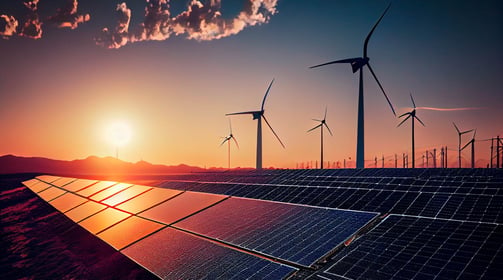Certified vocational training program in the field of renewable energy
Blog post description.
الهندسة الكهربائية و هندسة الطاقة
1/3/20241 min read
Certified vocational training program in the field of renewable energy


Introduction:
Does it focus on the techniques and strategies of generating, producing, and storing energy that are considered "green, clean," renewable, or sustainable? Using alternative energy involves a comprehensive understanding of policies and issues in addition to a balanced understanding of the technical and financial reality. Participants in the course gain insight into the application of renewable energy solutions and leave with practical elements and tools they can immediately apply to help companies or organizations define renewable energy project goals and maximize benefits when implementing renewable energy systems.
Course Objectives:
Understand the basics of traditional power generation, transmission, and distribution systems.
Understand the importance and roles of renewable energy in the modern era.
Maximize natural resources and convert them into renewable energy.
Understand the structure of components for different types of renewable energy.
Create awareness and understanding of different types of renewable energy.
Appreciate the benefits of harvesting renewable energy.
Understand the characteristics and processes of each type of renewable energy.
Program Content:
Renewable Energy and the World Today:
Basics of electricity generation and transmission.
Traditional methods of energy generation.
Overhead and underground energy transmission.
AC power distribution system.
Smart grids.
Microgrids.
Types and Characteristics of Renewable Energy and Solar Energy Generation:
Overview of available renewable energy.
Advantages of solar energy generation.
Characteristics of solar panel installation.
Types of solar cells (photovoltaic).
Inverter and smart meter.
Operating solar-powered parks.
Wind Energy, Wind Turbine Construction, and Operation:
Overview of electricity generation from wind.
Wind turbine construction.
Operations and characteristics of key components of wind turbines.
Advantages of wind energy.
Designs of rotor blades.
Onshore and offshore wind farms.
Hybrid Renewable Energy Systems:
Characteristics of biomass energy generation.
Operations and components of renewable biomass energy.
Characteristics of tidal energy generation.
Operations of tidal and wave energy for renewable energy.
Operations of hybrid renewable energy systems.
Advantages of hybrid renewable energy systems.
Distributed Energy Resources (DER) and Energy Storage System:
Importance of distributed energy resources.
Integration of renewable energy into the grid.
Energy storage systems.
Larger-capacity batteries.
Case studies, selection, and design.
The Fifth Settlement - N 90th Street - Trivium Business Complex - Third Floor - 332
New Cairo City, Egypt
